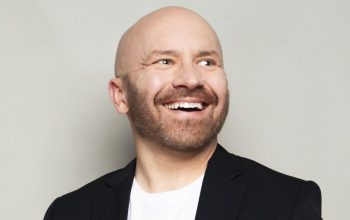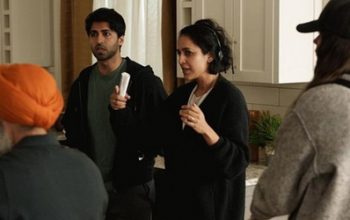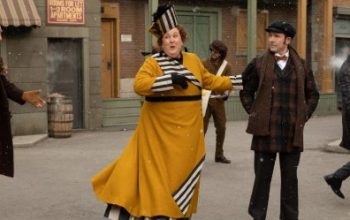[Warning: General spoilers ahead.]
We’re down to the final two episodes of The Romeo Section‘s second season and I’m telling you now that Brian Markinson will break you Wednesday night. If he’s not recognized for this role next year, they’re seriously not paying attention.
The hour follows a completely unspooling Norman as he goes right over the edge to track down Michael Gary and avenge Sonya’s murder, all while Wolfgang is working his own channels to really stop that from happening.
On the other side of the episode, Al test drives his new opportunity as Lily mulls her indirect directive. Rufus brings Lana to work and gets a new assignment from Tony about Jimmy Wa, who’s asserting his hold on Mei Mei.
When I visited the set last month, I chatted with creator and showrunner Chris Haddock about the second season, crafting his character arcs, and telling the bigger stories.
Haddock explained that crafting a 10-episode season vs. the longer runs of his earlier shows requires rethinking where you break the season up. “With 12 or 13 episodes, you have three acts. With 10 episodes , you’ve got 5 and 5. It’s working blocks and arc blocks, and the timing of when you have to start turning characters around for the home stretch and some of the plots toward their conclusions [happens] around episode 8,” he says.
“This year, I was very conscious of not cluttering up the back end … tipping the hat to every character. I was aware of how unsatisfying that is. I was pinching [their conclusions] off carefully, ending some [arcs] at the end of episodes 8, 9, and 10 [so that] 10 let me work a little more broadly with the main plotlines.”
“At the start of the season, I start plotting. I don’t worry about all the details and twists and turns. I try to figure out where the arc for each character will end, and that gives me a [fixed number] of episodes to get them there. As you go through the season, you realize you want to spend [more or less] time with an arc. You have to be flexible and responsive to that. You often find at the outline stage you’re stealing things from the next episode and you take another episode to give a development more time.”
“Sometimes you don’t realize something isn’t working until you see it. [Something] might sound good in the read through but you have to be prepared to pull levers [and make changes] all the time. If you see something’s not working right away, you need to adjust, no matter how radical it might feel.”
Haddock embraced the idea of the false flag as the focus for this season, if for no other reason than to demystify it, and Norman was the perfect character to drive that arc. “The whole idea [of the show ] is that it’s seeded in seduction and seducing people. Last year, I was thinking I’d create a gay Romeo spy. When I started thinking of this character, [I knew] Brian could play him without the sexuality being the sole focus but it gave him a real different appeal,” he shares.
“I wanted to approach [the false flag] so that we seed in and validate conspiracy [and] it becomes less trivialized. We took apart this cover-up and introduced innuendo and conspiracy thinking, but not making it madness. Norman slowly convinces Wolfgang of certain aspects and Wolfgang starts to consider it. They are the same mind split into two.”
“False flags are a very popular technique for escalating [things] before a vote. It needs to be seen as not just an outlier idea of explaining the world. It’s a tried-and-true tactic. Let’s talk about that. They do it in business and real estate. That’s very satisfying because now we’re talking about strategy and tactics. When you talk about this, you can see the actors in the scene portraying that. It’s like you have the playbook before the quarterback throws the ball.”
One of Haddock’s signatures is giving his characters room to talk, and he says he very specifically writes those scenes for his actors. “[I often ask], ‘What kind of situation can I put the character in to get those qualities that I think are best for that actor?’ I don’t follow the rules of banter dialogue, which is very popular in American TV as a way of keeping drama with momentum,” he points out.
“I think [there’s a fear] about a two-page scene with big chunks of dialogue [being] boring. Monologues delivered by excellent actors are compelling. When we start shooting them, they really seem to go by much quicker than they look on the page. It’s putting faith in drama and in actors and the audience that if they’re drawn to this type of show and they like the discussion of ideas [they’ll be happy].”
The Romeo Section airs Wednesdays at 9:00/9:30 NT on CBC. If you missed an episode, you can catch them online at CBC. Here’s a sneak peek of “Out Future World.”
Photos and Video Courtesy of CBC.



One thought on “Chris Haddock Talks The Romeo Section + “Our Future World” Preview”